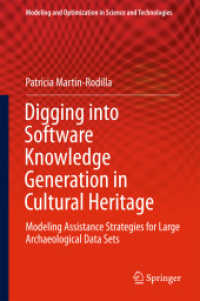Full Description
It is our great pleasure to welcome you to the 2nd International Workshop on Spoken Dialogue Systems Technology (IWSDS), which was held, as a satellite event of INTERSPEECH 2010, at Gotemba Kogen Resort in the Fuji area, Japan, October 1-2, 2010. The annual workshop brings together researchers from all over the world working in the ?eld of spoken dialogue systems. It provides an international - rum for the presentation of research and applications and for lively discussions among researchers as well as industrialists. Building on the success of IWSDS 2009Irsee,Germany,thisyear'sworkshopdesignated"SpokenDialogueSystems for Ambient Environments" as a special theme of discussion. We also enco- aged discussions of common issues of spoken dialogue systems including but not limited to: - Speech recognition and semantic analysis - Dialogue management - Adaptive dialogue modelling - Recognition of emotions from speech, gestures, facial expressions and ph- iological data - User modelling - Planning and reasoning capabilities for coordinationand con?ict description - Con?ict resolution in complex multi-level decisions - Multi-modality such as graphics, gesture and speech for input and output - Fusion and information management - Learning and adaptability - Visual processing and recognition for advanced human-computer interaction - Databases and corpora - Evaluation strategies and paradigms - Prototypes and products The workshop program consisted of 22 regular papers and 2 invited keynote talks.
This year, we were pleased to have two keynote speakers: Prof. Ram' on L' opez-C' ozar, Universidad de Granada, Spain and Prof. Tetsunori Kobayashi, Waseda University, Japan.






